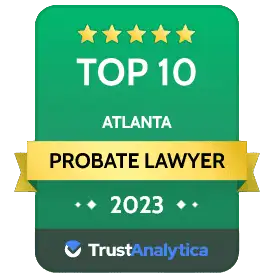Asset Management: Atlanta Wills and Estate Attorney for Every Family
Why You Need Estate Planning Services
Do you own a house? A life insurance plan? A family heirloom? Do you have children, pets, or someone who depends on you for care? Then you need an estate plan. If you own assets of any kind – no matter how small it may seem to you – know that you have an estate and therefore need an estate plan. Creating an estate plan is especially important if you have a family or are planning to have one and want to ensure that they will be taken care of.
Wills and Trusts are the most well-known estate plan documents. These documents direct how your estate is managed. A Will directs how your assets are distributed after your death and is a document of public record—because it is filed through Probate Court after your death. While a Trust also directs how your assets are managed, however this begins on the date the Trust is established and continues after your death. A Trust is not made public.
Information for Residents
Which Estate Planning Documents Do I Need in Georgia?
Georgia Wills
A formal, legal will directs the distribution of your assets as you see fit. Wills can appoint a guardian for minor children and establish who will handle the administration of your estate.
Powers of Attorney
Also known as a “durable financial power of attorney,” this allows you to nominate someone to handle your finances if you're unable to do so. These can alleviate the need to appoint a legal guardian.
Health Care Directives
Here, a living will or medical power of attorney is called an Advance Directive for Health Care. It appoints someone to make decisions when you cannot and establishes your medical treatment preferences.
HIPAA Authorizations
The Health Insurance Portability and Accountability Act of 1996 provides for medical data privacy. You must legally authorize individuals to have access to your records so providers are able to share information.
Standby Guardian Designations
A designation of Standby Guardian allows you to appoint someone with legal authority to care for your child in case of an emergency during your lifetime when you cannot care for them yourself.
Setting up Georgia Trusts
Trusts help manage how and when your assets and property are distributed. There are many types of trusts, some of which are free standing and some of which are included within your will.

Decision Management
Why Should I Start Planning Now?
Nobody wants to think about handing over the reins if they’re incapacitated, and no one likes to think about what happens to their family and assets after they die, but planning for that possibility can save your loved ones tremendous stress and heartache. Sometimes, family must make that life-saving medical decision or honor your life-ending-plans, no matter how painful. Having a written, legal plan in place makes those difficult times a little easier.
And no matter how unromantic it may feel, having a solid estate plan in place is one of the most loving things you can do for your family and loved ones. You are caring for them in death by giving them the gift of knowing your last wishes so they may follow them.
Family First Focus
How Do I Know Where to Start?
Every family should have a plan tailored to their unique and specific needs. Having a knowledgeable advocate who can walk with you through the process is so important. Whether you are looking to write your first will, modify an existing one, set up a trust, draft an advance directive for health care (living will), start the process of probate, or address any other estate planning issue, Siedentopf Law is here to help.
Is a handwritten will valid with no witness?
A handwritten will is called a “holographic will” and it is NOT valid in Georgia. The issue is not the method of putting your wishes to paper - it doesn’t matter who puts the words down or whether they are typed or handwritten. It's whether or not it was witnessed and signed. In Georgia, a will is only valid if there are two witnesses who have signed it.
Do I need a notary for my will?
A notary is not necessary for a will in Georgia if there are two witnesses who have signed it – it will still be viewed as valid. However, it can make enforcing it more efficient. A notarized will with a special affidavit and two witnesses is called a “self-proving will.” Witnesses will not be required to testify in court that the signatures are theirs.
Decision Management
How do I Choose the Right Estate Planning Attorney?
Choosing the right family estate lawyer to carry out your estate planning wishes can be a daunting decision. Having someone on your team who is there for you and your family when you need legal guidance during some of the most important and personal life decisions is very important. Sarah Siedentopf, an Atlanta estate planning attorney, probate attorney, and published estate planning author, has been practicing estate law in Atlanta for over 12 years and she is here to help.
There are a vast array of legal estate planning issues that can arise when making estate related decisions. And while some people may choose to represent themselves and handle their own estate planning without the guidance of an attorney, most would agree that having a qualified attorney by your side is always the best course of action. But how do you go about finding the right estate lawyer for your needs?
By defining your goals, you can figure out exactly what you want to accomplish and create a list. After you have your goals, do your research, ask around, and always check client reviews. There is nothing wrong with having a consultation or interviewing your potential family estate lawyer to see if they are right for you! By following these steps, you will be able to find the best family estate attorney to guide you in the estate planning process!
What are the legal requirements for a will?
The estate laws vary from state to state and you should find an attorney who is knowledgeable about your state laws.
Georgia estate laws are unique in a few ways. The person creating a will, also called a testator, must be 14 years of age or older. The person creating a will must be competent to create a will. The will has to be in writing and signed by the testator. Furthermore, to be legal, two witnesses must sign the will. While not required by law, the will should also have a notarized “self-proving” affidavit, if possible. If the will is a self- proving will, that means the Court will not contact the witnesses to verify that the will was indeed witnessed by them—saving your loved ones time in the Probate process.
If you have a family, and you want to ensure that they will be taken care of, it’s especially important to create an estate plan. By doing so, you can make sure that your family won’t have to go through the hassle of hiring a lawyer and that they’ll be able to keep your stuff in the event of your death. And if you live in Atlanta, we urge you to schedule a consultation with Siedentopf Law.
What is my “estate”?
A person’s estate refers to everything they own minus any debt or liabilities. This could be a car, home, land, insurance plan, or even a debt such as a mortgage or personal loan. No matter what your estate consists of, everyone can benefit from estate planning to ensure that your estate is protected or placed into the right hands after an untimely passing.
An estate planning attorney’s job is to ensure that the right documents are set into place so you or your family are not stuck with a mess. This can bring enormous stress on an individual after a family member passes away without setting up a proper estate plan. Let us guide you to create an estate plan that will protect you, your family, and your assets. Trust me, you DO NOT want the state to determine what happens to your estate.
Do I Need a Trust?
You might think that only the ultra-wealthy need trusts, but that's not necessarily the case. If you have young children, a trust can be a helpful way to ensure that they are taken care of if something happens to you. Trusts allow you and your family to avoid the hassle of the probate process. Trusts can also be used to protect your assets from creditors or to reduce your tax liability. Of course, there are also some potential downsides to setting up a trust, so it's important to talk to an experienced estate planning attorney before making any decisions. In the end, whether or not you need a trust will depend on your individual circumstances. So, if you're not sure, give us a call at Siedentopf Law and we can steer you in the right direction!
What is the difference between a trust and a will?
A trust is a legal arrangement in which one person (the trustee) holds property on behalf of another person (the beneficiary). The trustee has a fiduciary duty to act in the best interests of the beneficiary, and the property is usually managed by a professional trustee such as a bank or an attorney. Trusts can be used for a variety of purposes, including avoiding probate, minimizing taxes, and protecting assets from creditors.
Learn more about Trusts and if this estate planning tool is for you here.
A will on the other hand is a legal document that details how a person’s assets will be distributed after their death. Having a will in place can help to ensure that family members are taken care of, and that property is allocated according to the deceased’s wishes. Creating a will can be done with the assistance of an estate planning attorney.
Learn more about Wills here.
We know the process of estate planning can feel daunting, which is why we’re here! We welcome the opportunity to speak with you or meet with you to discuss how we may best address your estate planning needs. Call Siedentopf Law at 404-736-6066 or visit our contact page to schedule a consultation.






